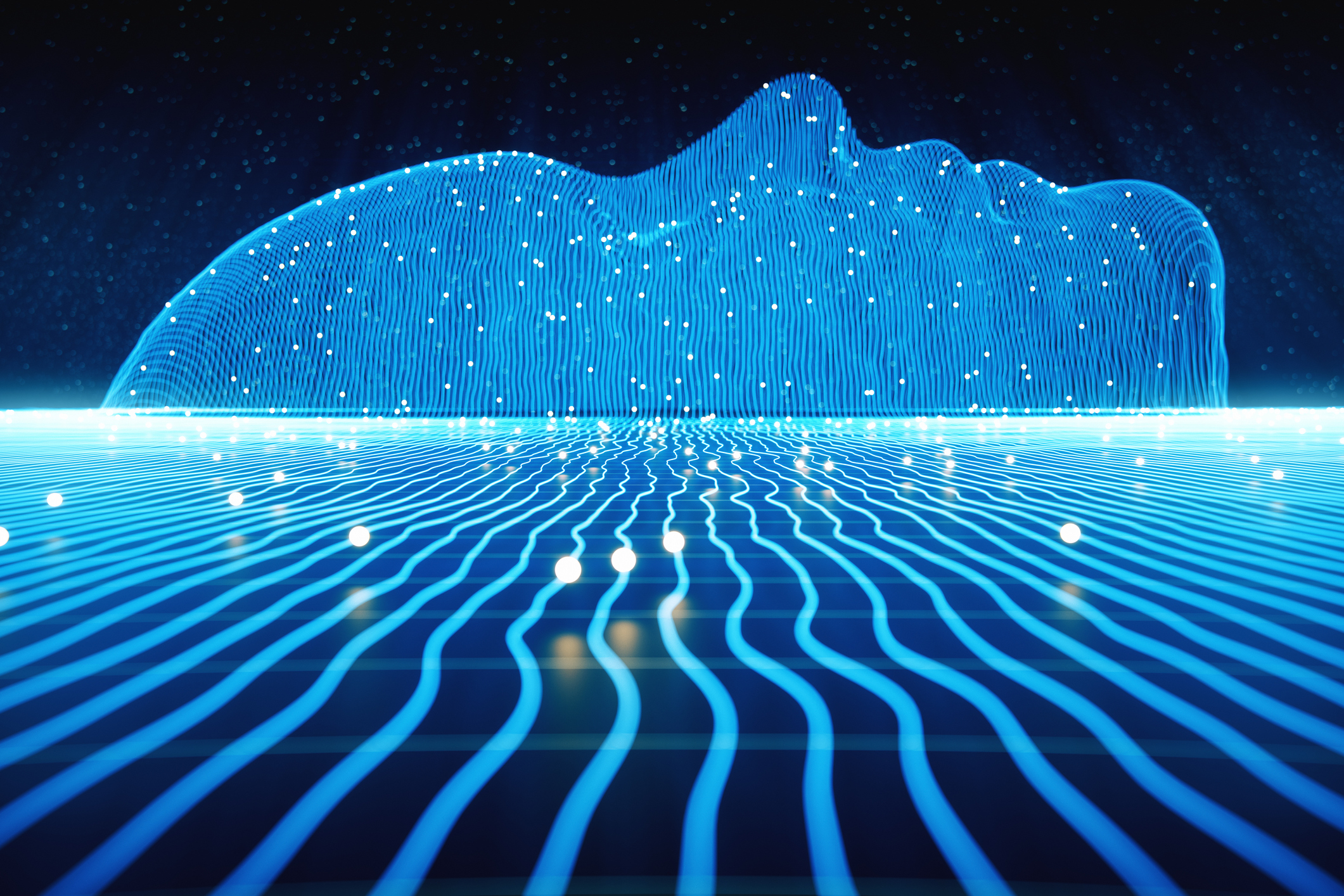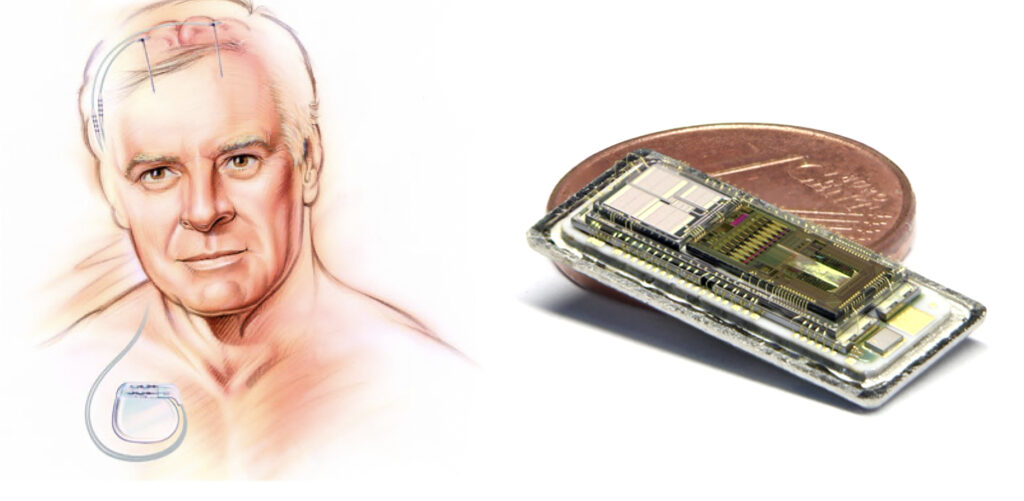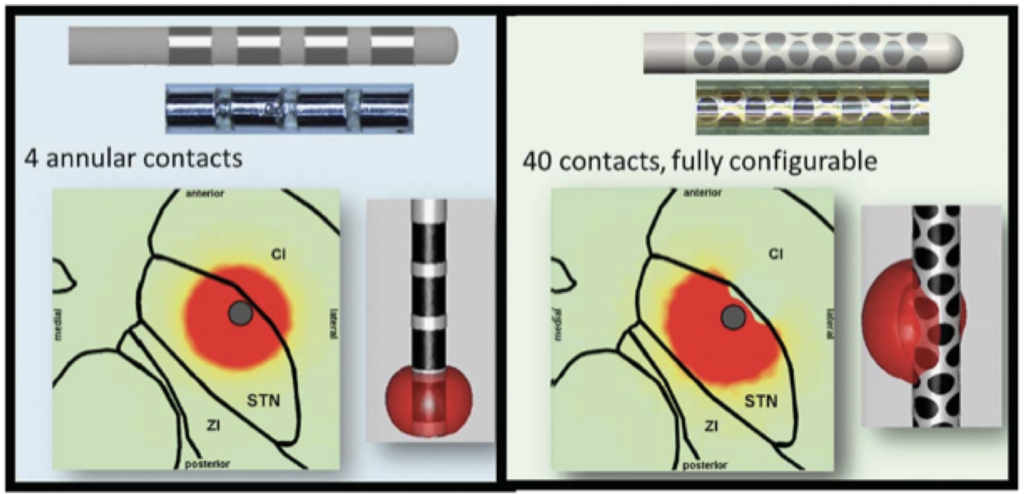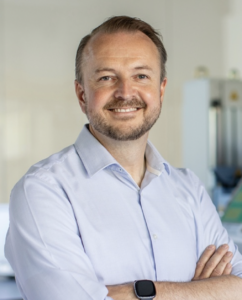The story of Sapiens and deep brain stimulation
Sapiens Steering Brain Stimulation (Eindhoven, NL) is founded in 2011 as a spin-out of Philips Research and got integrated into Medtronic in 2014. Their mission: to revolutionise personalised brain stimulation and treat neurological disorders such as Parkinson’s disease. Sapiens selected ICsense for the development of the core component in its product, the stimulation ASIC (Application Specific IC).
DBS is used to treat neurological disorders such as Parkinson’s disease, the right picture shows the custom 40-channel ASIC developed for Sapiens
DBS (Deep Brain Stimulation) is an effective and well-established treatment; an implanted device sends electrical impulses to carefully selected parts of the brain to treat neurological diseases. By personalizing these impulses using advanced implanted leads with 40 individual stimulation points, Sapiens aims to improve the therapeutic effect of deep brain stimulation, shorten the clinical procedure, and improve patient comfort by reducing stimulation-induced side effects as shown in the picture below.
The left picture shows a conventional DBS, while the right picture shows Sapiens steering brain stimulation with 40 configurable electrodes leading to improved directional stimulation
First of a kind
From day one, it was clear that a custom neuromodulation chip (or ASIC) was essential since a DBS device with 40 stimulation points was never done before. Standard deep brain implants have 3-5 electrodes and are driven by an IPG (Implanted Pulse generator) in the chest. Sapiens’ solution used an adapted chest based IPG design that supplies the stimulation pulses through the lead to the ASIC which is on the patient’s skull. The ASIC distributes the pulses through a high-voltage matrix and is able to sense all electrodes with artefact reduction and to measure impedances. Powering of the ASIC is done over the lead through DC-AC-DC conversion.
The path to the best ASIC for Sapiens
Sapiens selected ICsense based on its impressive track record in medical implantable ASICs. The team at Sapiens appreciated the transparent and honest communication of ICsense and chose the Leuven company to be their preferred custom ASIC design partner. ICsense’s ASIC expertise but also its system level thinking was an added value for Sapiens in order to take this next step.
At the start of the cooperation, both teams from Sapiens and ICsense worked very close together on the feasibility of the target architecture and balancing the trade-offs of the full system. Given the leapfrog in the state-of-the-art and many challenges, ICsense’s flexibility and open way of working, proved to be key to the success. By advancing at the pace of the customer and taking the time to explore, the best solution for Sapiens’ system was found.
Hubert Martens, Vice President of Product Development and co-Founder at Sapiens, confirms: “ICsense developed this first-of-a-kind and innovative ASIC for stimulation and measurement in our 40-electrode deep brain implant. Next to the high technical and quality standards that ICsense employs, we strongly appreciate their open, honest and flexible way of working, which was key to the success of this development.”
By combining ICsense’s ASIC design expertise with Sapiens in-depth system know-how, both companies managed together to define the right set of ASIC specifications and system requirements (lead integration, packaging, …). An important factor for this cooperation was having a person at Sapiens who has in-depth knowledge of electronics and the system.
“We selected ICsense, because they have all the right profiles in-house, unlike aggregation partners that just bring together different companies to do the work without creating additional value. In every step of the development, we could rely on ICsense’s support and have in-depth and open discussions without any unpleasant surprises. ICsense does not work as a consultant but as a true partner we can trust,“ concludes Martens.
ICsense has all the right profiles in-house, unlike aggregation partners that just bring together different companies.
Hubert Martens, VP and co-founder of Sapiens
Beyond the design
Based on the specifications, ICsense designed, manufactured and tested this IC for full functionality in its lab facilities in Leuven, Belgium. In parallel, ICsense coordinated the test development with the selected OSAT (Outsourced Semiconductor and Test) partner, to test the custom chip in production with high test coverage (medical grade) and at the agreed price.
Also, in this last phase of the project, a close and open cooperation was key, with regular status meetings, in-depth reviews and even changes in specifications along the way to further optimize the system. ICsense proved to be flexible throughout the whole development process, which led to a successful ASIC that could steer the 40 electrodes from a conventional IPG, measure the brain signals and brain impedance with high-accuracy and low power and fit into a small cannister for implantation.
Not a one-shot cooperation
As a follow-up of this fruitful cooperation, ICsense designed two more ICs targeting Sapiens’ next-generation product requirements. Part of this work was financed via public funding (ECSEL InForMED, BRAINS Eurostars).
Bram De Muer, CEO of ICsense, comments: “ICsense also loves working with startup companies. They bring projects that go beyond the state-of-the-art and require an ASIC partner that can adapt to their changing ideas, is flexible and open and works closely with them to co-optimize the entire system. That’s a perfect fit with the ICsense way of working and culture: open, honest and a strong partner for its customers.”
“Thanks to our company culture”, continues De Muer, “we have a strong and stable growing turnover and one of the highest employee retention figures in industry. This is important, also for startups. It proves the successful execution of projects, and all know-how stays in the company. When customers return years later, they will see the same people who build their first ASIC. And happy customers, always come back….”
In 2014, Medtronic (NASDAQ: MDT) acquired Sapiens for an all-cash upfront consideration of approximately $200M. Medtronic established a global research and development center for its Neuromodulation business at Sapiens’ facility based in Eindhoven (The Netherlands).




